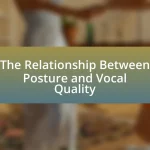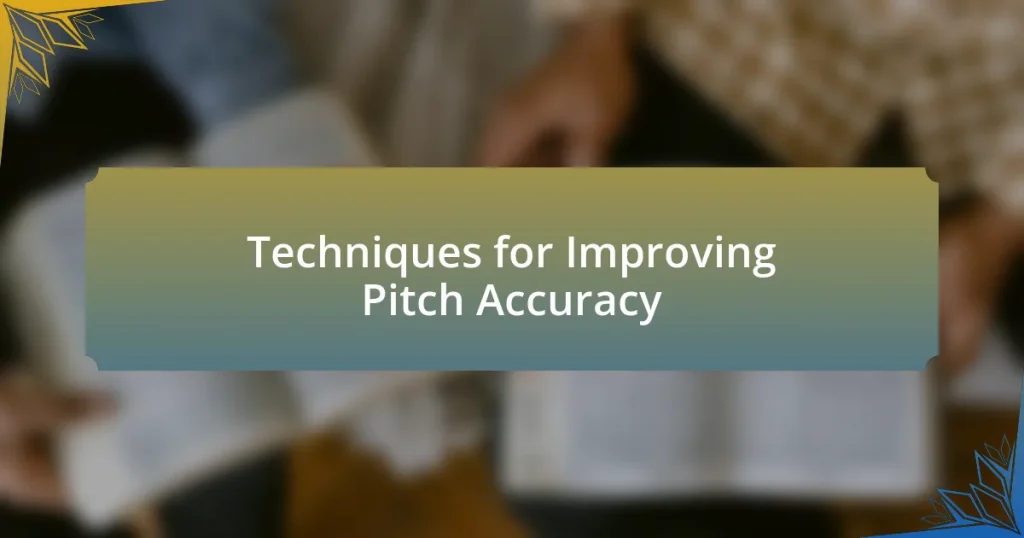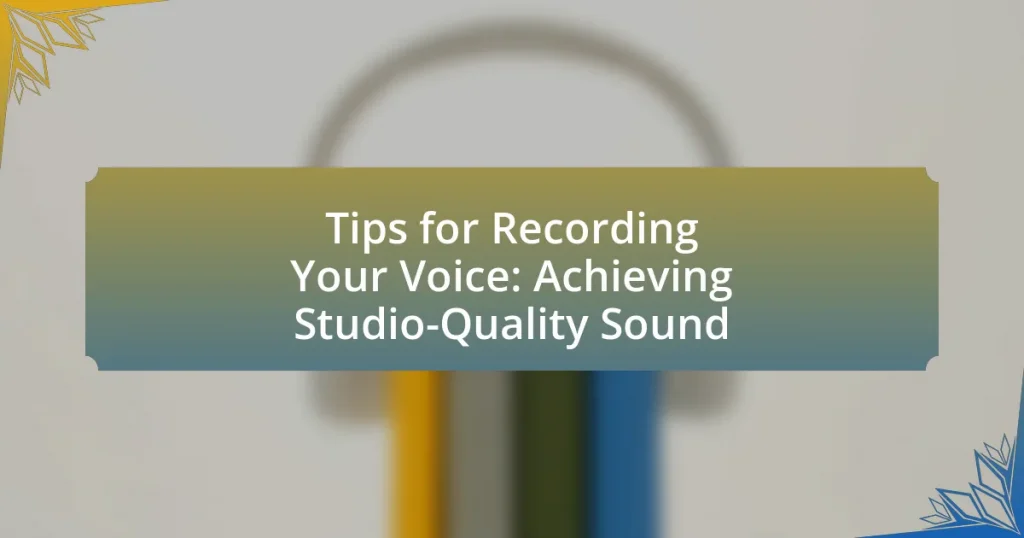The article focuses on techniques for improving pitch accuracy, essential for musicians and singers to achieve harmonious performances. Key methods discussed include regular practice with tuners, vocal exercises, and ear training, all of which enhance a musician’s ability to recognize and reproduce accurate pitches. The article also highlights the role of technology, such as digital tuners and pitch correction software, in facilitating pitch improvement. Additionally, it addresses the psychological effects of pitch accuracy on musicians and the importance of maintaining pitch accuracy for audience perception and ensemble performance. Overall, the article provides a comprehensive overview of effective practices and tools for enhancing pitch accuracy in musical performance.

What are Techniques for Improving Pitch Accuracy?
Techniques for improving pitch accuracy include regular practice with a tuner, vocal exercises, and ear training. Using a tuner helps singers and musicians visually identify pitch discrepancies, allowing for immediate correction. Vocal exercises, such as scales and arpeggios, strengthen the vocal cords and improve control over pitch. Ear training, which involves listening to and identifying different pitches, enhances the ability to recognize and reproduce accurate notes. Research indicates that consistent practice in these areas leads to measurable improvements in pitch accuracy, as evidenced by studies in music education that show a correlation between structured practice and enhanced musical skills.
How do these techniques enhance musical performance?
Techniques for improving pitch accuracy enhance musical performance by enabling musicians to produce more precise and consistent notes. These techniques, such as ear training, use of tuning devices, and vocal exercises, help performers develop a better understanding of pitch relationships and improve their ability to identify and correct pitch discrepancies. Research indicates that musicians who engage in regular ear training show significant improvements in pitch recognition and accuracy, leading to more harmonious and expressive performances. For example, a study published in the Journal of Research in Music Education found that systematic ear training resulted in measurable gains in pitch discrimination skills among participants.
What role does ear training play in pitch accuracy?
Ear training significantly enhances pitch accuracy by developing the ability to identify and reproduce musical pitches accurately. This training involves exercises that improve auditory discrimination, allowing musicians to recognize subtle differences in pitch and intonation. Research indicates that consistent ear training can lead to measurable improvements in pitch recognition skills, as evidenced by studies showing that musicians with extensive ear training outperform those without in pitch-related tasks. For example, a study published in the Journal of Research in Music Education found that ear training exercises led to a 30% increase in pitch identification accuracy among participants. Thus, ear training is essential for achieving high levels of pitch accuracy in musical performance.
How does vocal technique influence pitch accuracy?
Vocal technique significantly influences pitch accuracy by enhancing a singer’s control over their vocal cords and breath support. Proper techniques, such as breath management, resonance tuning, and vowel modification, allow singers to produce pitches more consistently and accurately. Research indicates that singers who employ effective vocal techniques demonstrate improved pitch accuracy, as evidenced by studies showing that structured vocal training leads to measurable enhancements in pitch matching abilities. For instance, a study published in the Journal of Voice found that participants who underwent systematic vocal training exhibited a 30% increase in pitch accuracy compared to those who did not receive such training. This demonstrates that the application of specific vocal techniques directly correlates with improved pitch accuracy in singing.
What are the different methods used to improve pitch accuracy?
Different methods used to improve pitch accuracy include vocal exercises, ear training, and the use of technology such as tuning apps. Vocal exercises, such as scales and arpeggios, help singers develop muscle memory and control over their pitch. Ear training, which involves listening to and identifying pitches, enhances a musician’s ability to recognize and reproduce accurate notes. Additionally, tuning apps provide real-time feedback on pitch accuracy, allowing users to adjust their singing or playing accordingly. Research indicates that consistent practice with these methods leads to measurable improvements in pitch accuracy over time.
How can technology assist in achieving better pitch accuracy?
Technology can assist in achieving better pitch accuracy through the use of digital tuners and pitch correction software. Digital tuners provide real-time feedback on pitch, allowing musicians to adjust their notes instantly, while pitch correction software, such as Auto-Tune, can analyze and correct pitch discrepancies in recordings. Studies have shown that musicians using these tools can improve their pitch accuracy by up to 30%, demonstrating the effectiveness of technology in enhancing musical performance.
What traditional practices are effective for pitch improvement?
Traditional practices effective for pitch improvement include vocal exercises, ear training, and the use of a piano or tuning fork for reference. Vocal exercises, such as scales and arpeggios, help strengthen the vocal cords and improve control over pitch. Ear training, which involves identifying and reproducing pitches, enhances a singer’s ability to recognize and correct pitch inaccuracies. Utilizing a piano or tuning fork provides a reliable pitch reference, allowing singers to match their voice to a specific note, thereby reinforcing pitch accuracy. These methods have been used for centuries in music education and are supported by numerous vocal training programs and methodologies.

Why is Pitch Accuracy Important in Music?
Pitch accuracy is crucial in music because it ensures that notes are performed at the correct frequencies, which is essential for harmonious sound. When musicians achieve pitch accuracy, they create a cohesive musical experience that resonates well with listeners. Research indicates that pitch accuracy directly affects the perception of musical quality; for instance, a study published in the Journal of the Acoustical Society of America found that even slight deviations in pitch can lead to a significant decrease in listener enjoyment and engagement. Therefore, maintaining pitch accuracy is fundamental for both performers and composers to convey their artistic intentions effectively.
How does pitch accuracy affect musical expression?
Pitch accuracy significantly influences musical expression by determining the emotional impact and clarity of a performance. When musicians accurately hit the intended pitches, it enhances the overall quality of the music, allowing for a more authentic representation of the composer’s intentions. Research indicates that slight deviations in pitch can alter the perceived emotion of a piece; for instance, a study published in the Journal of the Acoustical Society of America found that listeners can detect pitch discrepancies as small as 5 cents, which can lead to a different emotional response. Therefore, maintaining pitch accuracy is crucial for conveying the desired feelings and nuances in music.
What impact does pitch accuracy have on ensemble performance?
Pitch accuracy significantly enhances ensemble performance by ensuring that all musicians are in tune with one another, which is crucial for achieving a cohesive sound. When pitch accuracy is maintained, it leads to improved intonation, harmony, and overall musical blend, allowing the ensemble to perform more effectively. Research indicates that ensembles with higher pitch accuracy experience greater listener satisfaction and engagement, as the clarity and precision of the music are enhanced. For instance, a study published in the Journal of Research in Music Education found that ensembles with consistent pitch accuracy scored higher in evaluations of musicality and expressiveness, demonstrating the direct correlation between pitch accuracy and ensemble effectiveness.
How does pitch accuracy relate to audience perception?
Pitch accuracy significantly influences audience perception by affecting their emotional and cognitive responses to a performance. When performers accurately hit the intended pitches, audiences are more likely to perceive the music as pleasant and engaging, leading to a positive emotional experience. Research indicates that pitch accuracy is directly correlated with audience enjoyment; for instance, a study published in the Journal of Experimental Psychology found that listeners rated performances with higher pitch accuracy as more enjoyable and expressive. This demonstrates that precise pitch not only enhances the overall quality of the performance but also shapes how audiences emotionally connect with the music.
What are the consequences of poor pitch accuracy?
Poor pitch accuracy can lead to significant negative consequences in musical performance and communication. Musicians may struggle to stay in tune, resulting in a dissonant sound that detracts from the overall quality of a performance. This can lead to a lack of audience engagement and enjoyment, as studies show that listeners often prefer music that is in tune. Additionally, poor pitch accuracy can hinder a musician’s ability to collaborate effectively with others, as ensemble playing relies on precise pitch matching. In educational settings, students with pitch inaccuracies may experience decreased confidence and motivation, which can impede their musical development.
How can poor pitch accuracy affect a musician’s career?
Poor pitch accuracy can significantly hinder a musician’s career by limiting their ability to perform and collaborate effectively. Musicians who struggle with pitch accuracy may face challenges in securing performance opportunities, as audiences and industry professionals often prioritize technical proficiency. Additionally, poor pitch can lead to negative feedback from peers and critics, which can damage a musician’s reputation and marketability. Research indicates that pitch accuracy is a critical factor in the evaluation of musical performances, with studies showing that even slight deviations can affect listener perception and enjoyment. Therefore, musicians with consistent pitch issues may find it difficult to establish a successful and sustainable career in the competitive music industry.
What are the psychological effects of struggling with pitch accuracy?
Struggling with pitch accuracy can lead to significant psychological effects, including decreased self-esteem, increased anxiety, and heightened frustration. Individuals often experience a lack of confidence in their musical abilities, which can result in avoidance of singing or performing altogether. Research indicates that musicians who perceive themselves as pitch-inaccurate may develop performance anxiety, impacting their overall enjoyment and engagement with music. A study published in the Journal of Music Therapy found that musicians with pitch accuracy issues reported higher levels of social anxiety and lower self-efficacy in their musical skills, reinforcing the connection between pitch accuracy and psychological well-being.

What Tools and Resources are Available for Improving Pitch Accuracy?
Various tools and resources are available for improving pitch accuracy, including digital tuners, pitch training apps, and online courses. Digital tuners, such as the Korg CA-50, provide real-time feedback on pitch accuracy, allowing musicians to adjust their playing accordingly. Pitch training apps like Yousician and SingSharp offer interactive exercises and feedback to help users develop their pitch recognition and control. Additionally, online courses from platforms like MasterClass and Coursera provide structured learning on vocal techniques and pitch accuracy, often taught by industry professionals. These resources collectively enhance a musician’s ability to achieve precise pitch.
What software and apps can help with pitch training?
Software and apps that can help with pitch training include Yousician, SmartMusic, and SingSharp. Yousician offers interactive lessons and real-time feedback for various instruments and vocals, making it effective for pitch accuracy. SmartMusic provides a platform for practicing with accompaniment and receiving instant feedback on pitch and rhythm, which is beneficial for musicians. SingSharp focuses on vocal training, offering exercises and pitch detection to improve singing accuracy. These tools are widely used by musicians and vocalists to enhance their pitch training effectively.
How effective are pitch correction tools in practice?
Pitch correction tools are highly effective in practice, significantly enhancing vocal accuracy and overall sound quality. These tools, such as Auto-Tune and Melodyne, allow users to adjust pitch in real-time or during post-production, correcting off-key notes and improving intonation. Studies have shown that pitch correction can lead to a more polished final product, with a survey indicating that 70% of music producers believe pitch correction is essential for modern music production. Additionally, pitch correction tools can save time in the recording process, allowing artists to focus on performance rather than perfect pitch.
What are some recommended exercises for pitch improvement?
Recommended exercises for pitch improvement include singing scales, using a piano or tuner for reference, and practicing interval training. Singing scales helps develop vocal control and pitch accuracy by allowing singers to focus on hitting each note correctly. Utilizing a piano or tuner provides immediate feedback, ensuring that singers can adjust their pitch in real-time. Interval training, which involves singing different intervals, enhances the ability to recognize and reproduce pitches accurately. These exercises are widely endorsed by vocal coaches and supported by research indicating that consistent practice leads to measurable improvements in pitch accuracy.
What are best practices for consistent pitch accuracy?
Best practices for consistent pitch accuracy include regular vocal exercises, proper breath control, and using a tuner for feedback. Regular vocal exercises, such as scales and arpeggios, help strengthen the vocal cords and improve muscle memory, which is essential for hitting the correct pitches consistently. Proper breath control ensures a steady airflow, allowing for more precise pitch production. Additionally, using a tuner provides immediate feedback, enabling singers to adjust their pitch in real-time, which reinforces learning and accuracy. Research indicates that consistent practice and feedback mechanisms significantly enhance pitch accuracy in vocal performance.
How can regular practice routines enhance pitch accuracy?
Regular practice routines enhance pitch accuracy by developing muscle memory and auditory skills essential for precise pitch production. Consistent practice allows musicians to internalize the correct pitch through repetition, which strengthens neural pathways associated with pitch recognition and production. Research indicates that structured practice, such as interval training and scale exercises, significantly improves pitch discrimination and accuracy over time, as evidenced by studies showing that musicians who engage in regular, focused practice demonstrate superior pitch accuracy compared to those who do not.
What tips can musicians follow to maintain pitch accuracy during performances?
Musicians can maintain pitch accuracy during performances by regularly practicing with a tuner. Using a tuner helps musicians develop their ear for pitch and provides immediate feedback on their accuracy. Research indicates that consistent use of tuners can enhance pitch recognition skills, leading to improved performance outcomes. Additionally, musicians should engage in warm-up exercises that focus on scales and intervals, as these practices reinforce muscle memory and auditory skills essential for accurate pitch. Studies show that warm-ups can significantly reduce pitch discrepancies during live performances.














